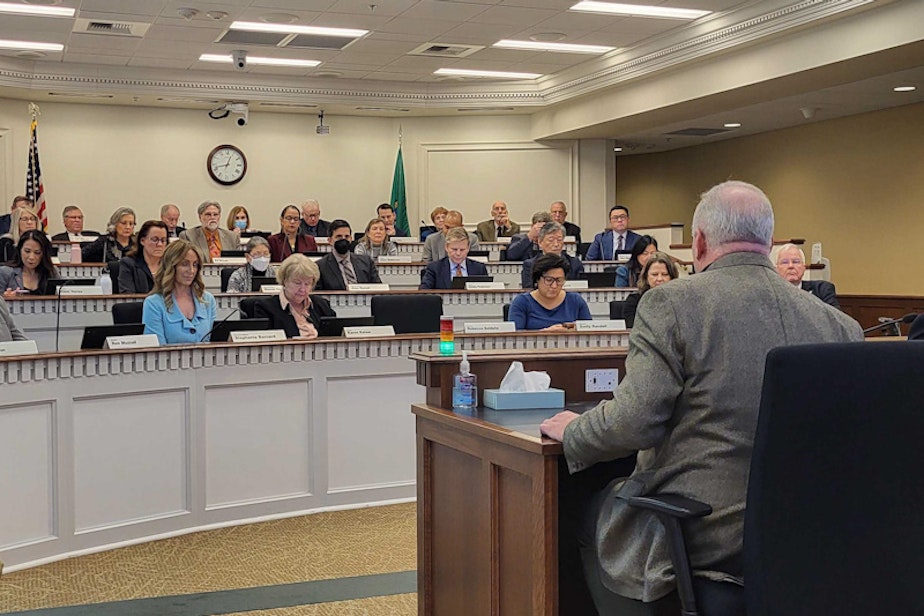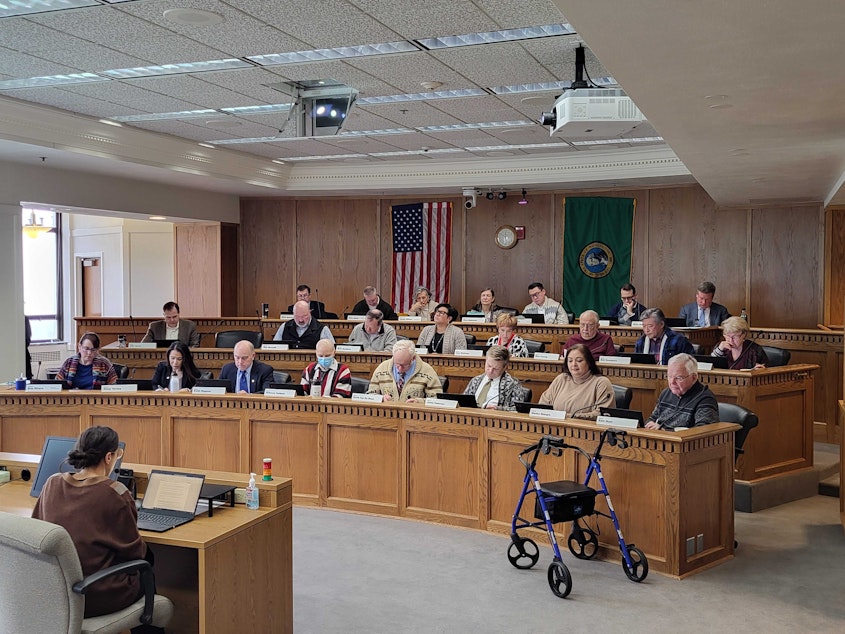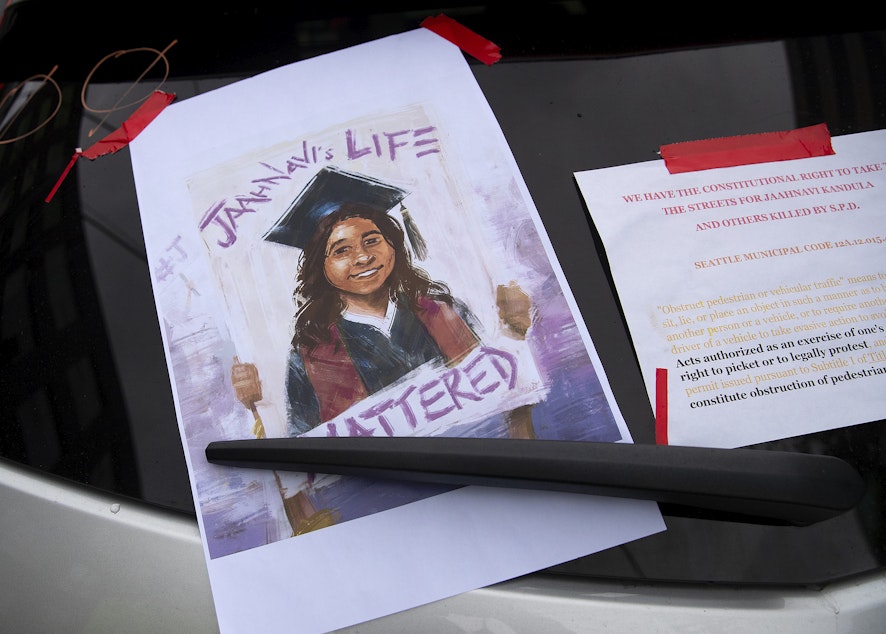

KUOW Blog
News, factoids, and insights from KUOW's newsroom. And maybe some peeks behind the scenes. Check back daily for updates.
Have any leads or feedback for the KUOW Blog? Contact Dyer Oxley at dyer@kuow.org.
Stories
-
Symbolic or pointless? Measure against nonexistent local income taxes could appear on Washington ballots
Politics
 Rep. Jim Walsh (R-Aberdeen) offered testimony at a joint committee hearing on I-2111, a measure to prohibit any new income taxes in Washington, Tuesday, Feb. 27, 2024. Walsh is the chair of the Washington State Republican Party, as well as the official sponsor of the initiatives being heard in the Legislature this week.NW News Network
Rep. Jim Walsh (R-Aberdeen) offered testimony at a joint committee hearing on I-2111, a measure to prohibit any new income taxes in Washington, Tuesday, Feb. 27, 2024. Walsh is the chair of the Washington State Republican Party, as well as the official sponsor of the initiatives being heard in the Legislature this week.NW News NetworkThe first of three voter initiatives that will get hearings in the Washington Legislature took center stage Tuesday. A joint committee of Senate and House lawmakers held a public hearing on Initiative 2111, which would prohibit the state or local governments from creating an income tax.
Nearly two dozen people offered public testimony on the measure. A small crowd attended the one-hour hearing, but several people who signed up to testify online didn't show up.
RELATED: 6 voter initiatives likely heading to Washington ballots this fall, explained
Overall, proponents of the measure said they don’t want more taxes, while opponents of the initiative said it would be pointless to enact. Washington does not currently have a personal income tax (even though it briefly did during the Great Depression), and a state analysis has shown I-2111 would not affect existing taxes or programs.
So lawmakers started the meeting Tuesday by asking questions about what impact the initiative could have. The initiative as written would ban income taxes from being created at the state and local levels, under the federal government's definition of "income."
Kai Smith, a lawyer at Pacifica Law Group, told lawmakers he worries voters might think the initiative would change something now.
"This measure, if enacted, would have no impact on our tax code or taxpayers today," he said.
Meanwhile, supporters of I-2111 say the measure is an opportunity to send a message to the Legislature that income taxes aren't welcome. Several attempts to create a type of income tax in the past have failed, and they say the initiative would also act as a barrier to any possible pitches to create income taxes in the future, as Democrats consider ways to make the state's tax structure more equitable.
"The people who have signed up in support of this initiative…have sent a clear message: Don't tax our income," said Amanda McKinney, a Yakima County Commissioner.
Even without the initiative, a statewide personal income tax likely wouldn't be able to address the inequity issue under current law anyway – an income tax in Washington would be subject to uniformity rules that disallow higher rates for wealthier people. That was a key issue weighed by the Washington Supreme Court after the state imposed the new capital gains tax, which is a 7% tax on profits from the sale of assets, like stocks and bonds, that exceed $250,000.
RELATED: Washington rent stabilization bill hits dead end in Senate — again
Continue reading » -
Seattle School Board vacancies draw more than a dozen applicants
Education
 Students, educators and supporters gathered to protest and demand full-funding of Black history and ethnic studies for students during an SPS school board meeting on Wednesday, Feb. 8, 2023, at the John Stanford Center along Third Avenue South in Seattle.KUOW Photo/Megan Farmer
Students, educators and supporters gathered to protest and demand full-funding of Black history and ethnic studies for students during an SPS school board meeting on Wednesday, Feb. 8, 2023, at the John Stanford Center along Third Avenue South in Seattle.KUOW Photo/Megan FarmerFifteen people have thrown their hats in the ring for the two open spots on the Seattle School Board.
The vacancies were created earlier this month, when board members Vivian Song and Lisa Rivera both suddenly stepped down amid concerns they were violating state residency requirements.
The school board shakeup comes amid looming budget cuts in Seattle Public Schools. Washington’s largest public school system faces a nearly $105-million budget deficit next year — and continued financial woes for the next several years.
RELATED: 2 Seattle school board members resign following questions about where they live
This spring, the school board is expected to not only review plans for next school year but also an overall plan for closing schools and other longer-term cost-saving measures.
Given those issues — and others, like academic recovery in the wake of the pandemic, escalating concerns about school safety, and a growing youth mental health crisis — the board wants to fill the open seats as soon as possible.
Candidates had until Sunday to submit their applications. The board plans to appoint the new members by the beginning of April.
RELATED: New Seattle schools fiscal plan: No closures next year, but 'nothing is off the table'
All Together for Seattle Schools, a new citywide parent advocacy organization, called on the board to appoint diverse board members, and to “acknowledge the resignation of two women of color board members as a call for internal organizational repair.”
The open letter, which has been signed by more than 130 people, also pushes the board to involve the public in the appointment process.
"We were hearing from a lot of families out of concern, once we learned that two board members are resigning, that their voices might not be a part of the conversation," said Erin MacDougall, one of All Together for Seattle Schools' leaders.
MacDougall says the group heard from many parents who believed the departing board members represented their community well and had "lived and work experience that were very well aligned with the needs of the board and of all of the students in the district."
And they want to see the new board members have those same qualities — especially amid such difficult financial times in the district.
Continue reading » -
Seattle tech workers brace for more layoffs, this time at Expedia
Business
 Seattle.
Seattle.About 200 Expedia employees in Seattle will be out of a job come May, according to a filing with the Washington Employment Security Department.
They’re among nearly 1,500 employees across the globe the Seattle-based travel tech company now plans to cut. That’s a little over 8% of Expedia’s workforce. GeekWire reported the layoffs will come primarily from the product and technology division of the company.
This is just the latest round of layoffs Expedia Group has made since 2020, when it slowly began reducing its workforce.
RELATED: TikTok cuts jobs as tech layoffs continue to mount
“Given the recent completion of many significant technical milestones in Expedia Group’s transformation, the business continues to evaluate the appropriate allocation of resources to ensure the most important work continues to be prioritized,” an Expedia Group spokesperson said in a statement to KUOW. “While this review will result in the elimination of some roles, it also allows the company to invest in core strategic areas for growth.”
CEO Peter Kern announced to employees in an internal memo Monday; Kern himself will be leaving his role in May, though he’ll remain the company’s vice chairman and stay on its board.
The Expedia layoffs are just the latest in a series of tech cuts in Seattle and around the globe.
RELATED: EBay to lay off 1,000 workers as tech job losses continue in the new year
San Franciso-based analyst Roger Lee, of Layoffs.fyi, said this post-pandemic tech-downsizing has been driven by a market shift toward “efficiency.” In other words, tech companies over-hired during the pandemic, and now, they’re cutting back; more than 260,000 jobs were cut in 2023.
“With Amazon and Microsoft continuing to make cuts as well, Seattle's tech employment faces challenges,” Lee said. though AI presents a promising opportunity.”
Continue reading » -
Why do I declare a party on my Washington presidential primary ballot? (And other things you should know)
Politics
 Democrats and Republicans listed on the 2024 presidential primary ballot in Washington state.Dyer Oxley / KUOW
Democrats and Republicans listed on the 2024 presidential primary ballot in Washington state.Dyer Oxley / KUOWBallots for Washington's 2024 presidential primary election are now arriving in mailboxes across the state. But to make their votes count, voters must declare that they prefer one party over the other. There are also plenty of candidates listed who are no longer running. What does this all mean? KUOW's presidential primary primer is here to help.
RELATED: Washington's GOP divide: He’s for Trump and she’s for Nikki Haley
Who: Democrats and Republicans present a handful of presidential candidates voters can choose from.
What: The winners of the primary election will represent their respective political parties on the November general election ballot. (Note: There will be some candidates listed on the primary ballot who have already backed out of the race. You can still vote for them, but they are not running for president anymore.)
Where: All Washington voters get ballots in the mail, which can be returned to an official ballot box or mailed back (must be postmarked by March 12). Voters can also go to a voting center on election day. Check here for more information about where ballot boxes and voting centers are located.
When:
- March 4: This is the deadline to register to vote online. If you mail in your voter registration, it must be received by an elections office by this date (note: not postmarked by this date).
- March 12: The official presidential primary election day. People can register to vote at county elections offices on this day. Ballots must be postmarked by this date, or ballots must be turned in to ballot boxes by 8 p.m.
- March 29: The final day the Secretary of State's Office will certify primary results.
Why do I have to check a box to declare a party?
Voters can only vote for one presidential candidate, in one party. You cannot vote for a candidate in each party. On the outside of the ballot, voters must check a box to declare they prefer Democrat or Republican. This means they are only participating in one party's primary selection. It does not mean they are registering for any political party. It also doesn't mean that the voter must vote for the party's candidate in the general election in November.
RELATED: Washington state braces for deepfakes ahead of 2024 elections
Continue reading » -
Puget Sound counties want modernized ferry fleets. Voters decide their fate this fall
Government
 Ferry systems serving San Juan, Skagit, and Whatcom counties are looking for funding options to solve service challenges; over-budget bids have temporarily stalled the planned all-electric replacement of the aging ferry between Anacortes and Guemes Island.Tom Banse
Ferry systems serving San Juan, Skagit, and Whatcom counties are looking for funding options to solve service challenges; over-budget bids have temporarily stalled the planned all-electric replacement of the aging ferry between Anacortes and Guemes Island.Tom BanseIslanders and Peninsula residents who rely on ferries to get around Puget Sound will tell you: Aging boats and an unreliable system are squeezing their way of life.
Often, these boats are the only way of getting back to the mainland for doctors appointments, to see family, or to go to school. Increasingly, counties are stepping up to fill the gaps created by the beleaguered Washington State Ferries with their own ferry services.
The state plans to help fund that effort, including new electric boats for Skagit County’s Guemes Island ferry run, and Kitsap County’s Seattle-Bremerton run.
Many replacement ferries and infrastructure upgrades are currently budgeted for in Olympia, said reporter Tom Banse, who's been covering this story for the Salish Current. But that funding may disappear after Election Day if Initiative 2117 successfully repeals the state's Climate Commitment Act, commonly known as the cap-and-trade program.
Continue reading » -
Washington rent stabilization bill hits dead end in Senate — again
Government
 The Senate Ways and Means Committee, shown here Feb. 26, 2024, did not vote on a rent stabilization bill before a key cutoff deadline, dooming the measure's chances this Legislative session.Jeanie Lindsay / Northwest News Network
The Senate Ways and Means Committee, shown here Feb. 26, 2024, did not vote on a rent stabilization bill before a key cutoff deadline, dooming the measure's chances this Legislative session.Jeanie Lindsay / Northwest News NetworkOne of the most high profile bills in Olympia has apparently stalled for the final time in the Legislature this year.
The measure, which aimed to slow rising rents in Washington, would have capped the amount most landlords could raise current tenants' rent each year. But the Senate Ways and Means Committee did not vote on the legislation before a cutoff deadline Monday.
RELATED: Can rent stabilization help Washington residents?
House Bill 2114 included a 7% cap on the amount most landlords could raise rent for existing tenants each year. It also capped fees and late fee charges for tenants, but the policy would not have applied to new buildings.
The policy has sparked fierce debate all session long – supporters say the policy is a crucial tool to help keep people in their homes, while opponents worry the legislation won't fix the problem of rising rental costs and could make the housing market even more challenging.
Lawmakers on the Senate Ways and Means Committee went to a closed-door meeting to discuss the legislation Monday morning, and once they returned, Chair June Robinson (D-Everett) said the bill would not be brought up for a vote. While there are legislative maneuvers that could possibly keep the bill in the mix, the committee's nonvote most likely means the policy will no longer be considered this session.
In a brief interview, Robinson said not enough Democrats and no Republicans on the committee would support the bill. She did not explain which aspects of the bill kept it from being voted on.
"I don't feel like I can comment on that," Robinson said.
The bill's sponsor, Rep. Emily Alvarado (D-Seattle) told reporters Monday afternoon it was unclear what, if any, changes might convince more senators to support the proposal.
"We did not hear specific feedback from senators about what it would have taken to get them to support this bill," Alvarado said.
Two Democrats on the committee, Sen. Kevin Van De Wege (D-Lake Sutherland) and Sen. Mark Mullet (D-Issaquah) were among those opposed to the legislation. A spokesperson for Van De Wege said he "isn't interested in commenting."
Meanwhile, Mullet did not pinpoint any one aspect of the policy as problematic, but worries that the bill could stifle efforts to build more housing by driving away home builders.
"If this bill were to pass, I think in three or four years we'd have substantially more people in a difficult spot," Mullet said, adding that the state should instead focus on ways to build housing more quickly.
But backers of the legislation say renters struggling with rising rent costs can't wait for the housing market to catch up with demand.
Chair of the Housing Committee in the House, Rep. Strom Peterson (D-Edmonds), criticized senators for not working more proactively on the legislation. The proposal was a top priority for House Democrats this session.
"There was one single amendment drafted to the bill," Peterson said. "They did not do the work and that is deeply upsetting."
The House bill's demise comes after it passed the House mostly along party lines, and weeks after a similar version stalled in a different Senate committee. Alvarado says she plans to bring the bill back again during the 2025 legislative session, and in an emailed statement, Robinson also promised to work on the issue of housing affordability more next year.
This post has been updated with new information throughout.
[Copyright 2024 Northwest News Network]
Continue reading » -
One guide to rule them all: Where to eat, hang, and party around Emerald City Comic Con 2024
Arts & Life
 The Raygun Lounge in Seattle's Capitol Hill neighborhood is a board game pub and pinball hub.Courtesy of Raygun Lounge
The Raygun Lounge in Seattle's Capitol Hill neighborhood is a board game pub and pinball hub.Courtesy of Raygun LoungeWhile Emerald City Comic Con takes over the Seattle Convention Center each year, there are even more festivities to be found in the surrounding area, outside the con.
Convention organizers are anticipating 85,000 attendees will flood into downtown Seattle for the 2024 event. That's a lot of fans. From food to transportation, afterparties, and more, here are a few ideas for navigating Seattle during Emerald City Comic Con 2024.
Emerald City Comic Con afterparties
Emerald City Comic Con has two of its own afterparties, including a big band concert and an "Under the Stars Prom." Outside of the con ...
Sonic Boom Box at Spin (1511 6th Avenue): Saturday, March 2, 8 p.m. to 1 a.m. Sonic Boom Box specializes in comicon afterparties. $25 at the door, but cheaper tickets online. Expect cosplay, a live DJ, dancing, and ping pong since this is at Spin after all. 21+
Tokyo Tonight at Q Nightclub (1426 Broadway): Sunday, March 3, 9 p.m. to 2 a.m. $20. Japanese DJ's playing J-pop and anime. 21+
The Rolling Bones party at The Whisky Bar (2122 2nd Avenue): Saturday, March 2, 6 p.m. until late. $10. Rolling Bones is a local club for gamers and geeks. They're hosting this party with DJs, comic-themed cocktails, and more. Club membership not required. 21+ (Warning: Organizers say they've already reached capacity based on RSVPs. Expect a line outdoors if you want to try this spot)
Anime Rave at WAMU: Black Tiger Sex Machine's anime rave. March 1-2, 7 p.m. Tickets start at around $50. All ages, with 21+ areas. Here's what to expect.
Where to hang around Emerald City Comic Con
Just because Emerald City Comicon closes for the night, doesn't mean the festivities end. There are a few spots con goers can easily get to from the convention center, and a few events happening outside the con.
Continue reading » -
Washington vs China: Why the NW could have the next generation of battery tech
Technology
 A "blade battery" made by Chinese company BYD for use in EVs (on display in Munich, Germany in 2023).
A "blade battery" made by Chinese company BYD for use in EVs (on display in Munich, Germany in 2023).China makes most of the world's car batteries. Washington could play a big role in helping the U.S. surpass China.
As the auto industry advances toward an electric vehicle future, China is currently the world leader when it comes to manufacturing car batteries. That means U.S. carmakers have to ask China for EV batteries, and they're not always at the front of the line.
RELATED: Big factory for electric car battery materials coming to Moses Lake, Washington
Senator Maria Cantwell from Washington says U.S. companies and scientists are gaining ground in this industry, however. And her state is poised to lead.
“We are kind of … becoming the epicenter on next generation battery technology, even for the international players,” she said at a Friday event in Seattle's South Lake Union neighborhood, the city's tech hub.
Whereas current lithium ion batteries use graphite anodes (in very simple terms, this is the part of the battery where the energy comes out), silicon anodes are viewed as the next big advancement in battery tech. Federal investments in Washington state have focused on these silicon batteries.
Silicon anodes have advantages and disadvantages. On the pro side, they charge much faster and hold far more energy. On the con side, they swell-up when charging, making the manufacture of a physically stable batteries difficult.
But local companies like Group14 in Woodinville say they've overcome that problem using brand new technologies that suspend the silicon in a sponge-like flexible matrix contained within a rigid shell. Like when rum is absorbed into a rum cake, the rum doesn't increase the cake's size.
RELATED: Surge of new EV charging stations coming to Washington state
Plus, Washington has cheap, green hydropower, a highly skilled workforce that's good at making things, and A.I. companies that nudge research along faster.
For example, the Pacific Northwest National Laboratory — a government funded, non-profit research organization — has partnered with Microsoft to conduct virtual scientific experiments using A.I. in order to more quickly find breakthroughs in battery design. One problem with this approach concerns the state's cheap energy — it's not unlimited. And A.I. consumes massive amounts of power.
Continue reading » -
Gay veterans discharged under 'Don't Ask, Don't Tell' could have benefits restored
Government
 Daniel James / Unsplash
Daniel James / UnsplashU.S. Rep. Lori Chavez-DeRemer (R-Oregon) has introduced a federal bill to reverse dishonorable discharges for veterans who were dismissed under the military's former "Don’t Ask, Don’t Tell" policy.
The policy was enacted in 1994 to allow LGBTQ+ people to serve in the military but only if they concealed their sexual orientation. The policy was repealed in 2011.
Still, the policy's legacy continues to affect veterans today, Chavez-DeRemer said in a statement. Service members who were discharged under "Don't Ask, Don't Tell," or DADT, have faced discrimination from employers and landlords, she said.
"The Recover Pride in Service Act will ensure these veterans can get their discharge status upgraded without lifting a finger," Chavez-DeRemer said of the bill. "I'm grateful to have strong support from my colleagues, including veterans, and I look forward to working with them to get this overdue fix signed into law."
The act would require the U.S. Department of Defense to inform veterans of their right to request a discharge status review. Additionally, the defense department would have to proactively upgrade all discharges based on sexual orientation from dishonorable to honorable within five years of enactment if the act is approved.
(In September 2023, the defense department said it would proactively review military records of veterans whose "administrative separation was the result of their sexual orientation and who received a less than honorable conditions discharge.")
According to defense department data, 13,472 people were discharged military service under the "Homosexual Conduct" policy between 1994 and 2011, when Don't Ask Don't Tell was in effect; that includes honorable and "other than honorable" categories. Nearly 33,000 people were discharged under that policy going back to 1980.
Chavez-DeRemer told KGW in Portland the Recover Pride in Service Act would apply to people who were dishonorably discharged under Don't Ask Don't Tell as well as veterans who served before that policy was enacted.
A dishonorable discharge is considered the most severe military discharge. Someone who is dishonorably discharged may not receive VA benefits, may not possess a firearm, and may lose other veteran benefits. Conduct that may result in a dishonorable discharge includes espionage and felony crimes, like murder.
Chavez-DeRemer's bill, co-sposored by 12 of her fellow Republican representatives, has won support from the Log Cabin Republicans, an organization that advocates for LGBTQ+ conservatives.
"Log Cabin Republicans is proud to stand in strong support of this bill, and we urge all Members of Congress to do the same," said Charles T. Moran, the organization's president.
Continue reading » -
Grocery worker protections move forward in Washington in preparation for merger disruptions
Business
 Diane Martin Rudnick is portrayed while grocery shopping on Thursday, Feb. 23, 2023, at Fred Meyer along Aurora Avenue North in Shoreline.KUOW Photo/Megan Farmer
Diane Martin Rudnick is portrayed while grocery shopping on Thursday, Feb. 23, 2023, at Fred Meyer along Aurora Avenue North in Shoreline.KUOW Photo/Megan FarmerA bill protecting Washington state grocery workers is heading to Gov. Inslee's desk amid the Kroger-Albertsons merger.
By a vote of 60-33 on Thursday, House lawmakers approved legislation requiring most grocery workers in the state to be retained for at least six months after stores begin operating under the merger. Kroger and Albertsons want to sell off 413 stores as part of the merger, including 104 in Washington.
Rep. Mary Fosse (D-Everett) said this bill provides stability for workers who were on the frontlines during the pandemic.
“They were the ones making sure we had food on our table for our children, for our families — the ones making sure that we had the necessities we needed during that time,” Fosse said.
The bill also would require compensation for workers who are let go.
Lawmakers who voted against the bill said they support grocery workers too, but see the bill as an "overreach of government." Among them was Rep. Suzanne Schmidt (R-Spokane Valley), who argued the bill would have repercussions beyond the Kroger-Albertsons merger.
“I don’t think it’s the government’s responsibility or duty to dictate or to interfere in a buy-sell agreement,” Schmidt said.
The legislation only kicks in if the merger goes through. So far, the $25 billion deal faces legal hurdles, including lawsuits from the states of Washington and Colorado.
Continue reading » -
Doctor at Joint Base Lewis-McChord allegedly sexually abused dozens of patients
Crime
 FILE- In this April 3, 2017, file photo U.S. Army soldiers march in formation during a change of command ceremony at Joint Base Lewis-McChord in Washington.AP Photo/Ted S. Warren, File
FILE- In this April 3, 2017, file photo U.S. Army soldiers march in formation during a change of command ceremony at Joint Base Lewis-McChord in Washington.AP Photo/Ted S. Warren, FileAn Army doctor is set to be arraigned Friday for allegedly sexually abusing dozens of patients at Madigan Army Medical Center, which is located on Joint Base Lewis-McChord.
The Army has charged Maj. Michael Stockin with 48 counts of abusive sexual contact and five counts of indecent viewing under the military code of justice, according to CBS News, which interviewed two of Stockin's 42 alleged victims. All 42 alleged victims were men; an attorney representing one of the alleged victims told CBS he believes there could be hundreds of victims.
One of the soldiers who spoke to CBS — both men spoke to the outlet anonymously out of fear of retaliation — said he went to Stockin for shoulder pain.
"He first checked my shoulders and then he asked me to stand up and to pull down my pants and lift up my gown," the soldier told CBS. "Dr. Stockin, he was face level with my groin, and he started touching my genitals."
Another man told CBS he was sexually abused by Stockin on three occasions and described a similar "alternate assessment" that left him confused.
The matter is now being prosecuted by the Army's Office of Special Trial Counsel.
Stockin was expected to plead not guilty at Friday's hearing, according to Stars and Stripes.
"Through close collaboration with the criminal investigators, OSTC thoroughly evaluated the evidence and carefully considered all the facts before referring charges in this case," Michelle McCaskill, communications director for Army OSTC, told CBS.
"We are confident that the facts and evidence support a conviction and that will be demonstrated when the case goes to court this fall."
If convicted of all charges, Stars and Stripes reported Stockin could spend the rest of his life behind bars.
Continue reading » -
Cleared of felony, Seattle cop who killed Indian student Kandula could end up in municipal court
 Protesters gather for a rally in honor of Jaahnavi Kandula, who was killed by a Seattle Police Officer while crossing a street, on Saturday, September 23, 2023, at the intersection of 5th Avenue South and South Jackson Street in Seattle.KUOW Photo/Megan Farmer
Protesters gather for a rally in honor of Jaahnavi Kandula, who was killed by a Seattle Police Officer while crossing a street, on Saturday, September 23, 2023, at the intersection of 5th Avenue South and South Jackson Street in Seattle.KUOW Photo/Megan FarmerThe Seattle City Attorney said Thursday that it is reviewing the case of the police officer whose vehicle struck and killed a pedestrian last year.
Officer Kevin Dave could face a penalty for negligent driving in the crash that killed 23-year-old graduate student Jaahnavi Kandula in January 2023.
The infraction would not create a criminal record; it would be recorded on his driving record.
The announcement comes after the King County Prosecutor’s Office declined to file any felony charges in the case this week.
Prosecutors said Officer Dave was responding appropriately to a 9-1-1 call, but that the crash was caused by Dave’s high rate of speed, which reached up to 74 miles per hour as he drove his Ford Explorer SUV through a 25-mile-per-hour zone in Seattle’s South Lake Union neighborhood.
In announcing their findings, prosecutors said some may argue that Dave showed negligence by driving so fast, but negligent driving does not meet the legal threshold for felony criminal charges in Washington, which must meet a different standard of driving with disregard for the safety of others.
Senior Deputy Prosecutor Amy Freedheim said, “If somebody is negligent and causes the most catastrophic of consequences, it is not a felony in our state, and the courts have been clear about that.”
But they said Seattle police still could forward the negligence case to the city attorney.
Seattle Police did just that, referring the case to municipal court for the lesser charge of negligent driving in the second degree “with a vulnerable user victim," because the collision involved a pedestrian. It’s a traffic infraction that carries a civil penalty, with a fine up to $5,000.
“The City Attorney’s Office Criminal Division will thoroughly review the referral prior to making a decision,” the statement said.
Critics say Dave's speed that night should lead to more severe consequences. They call Seattle Police policies on emergency response overly vague and say the department needs to better address which speeds are appropriate.
Seattle’s Community Police Commission asked, “At what speed would Officer Dave have had to drive for his emergency response to be considered reckless or disregarding the safety of pedestrians in the area?”
Continue reading »
